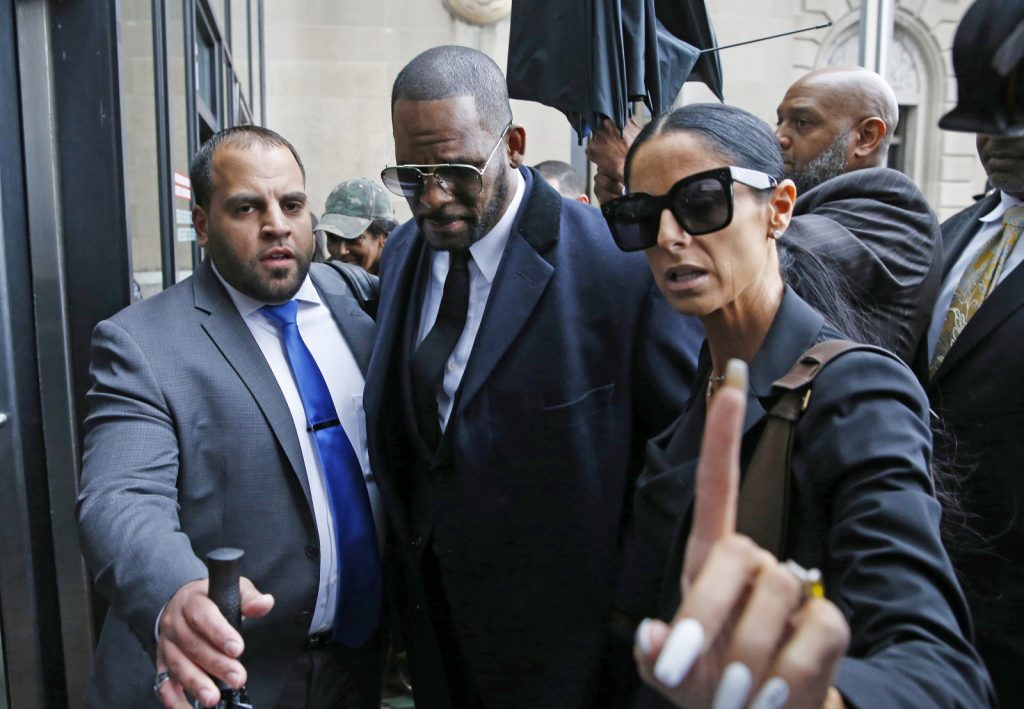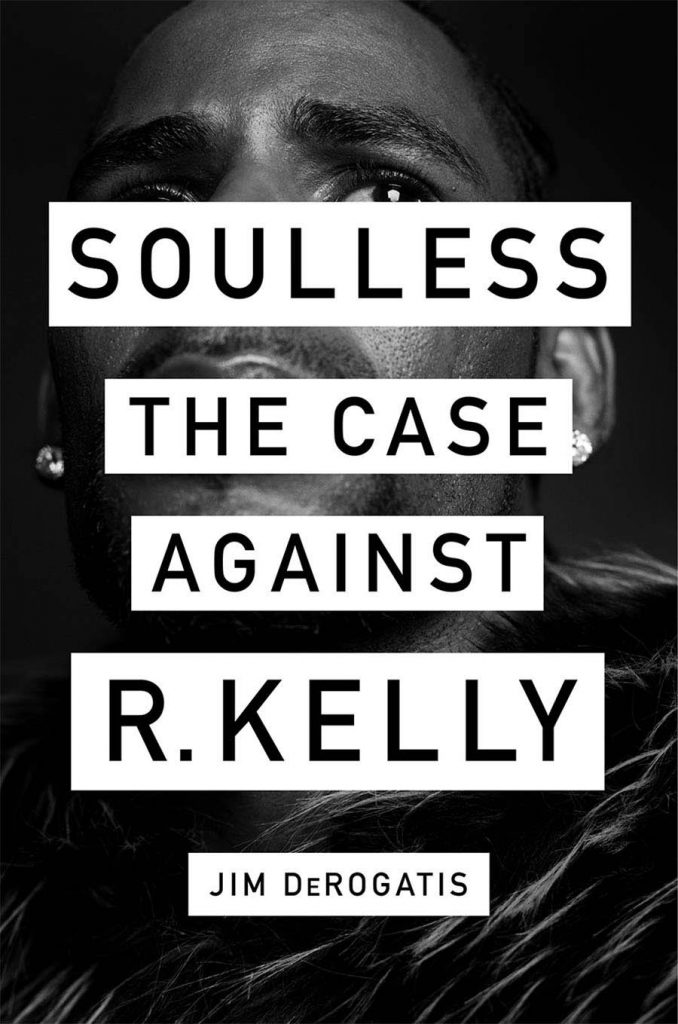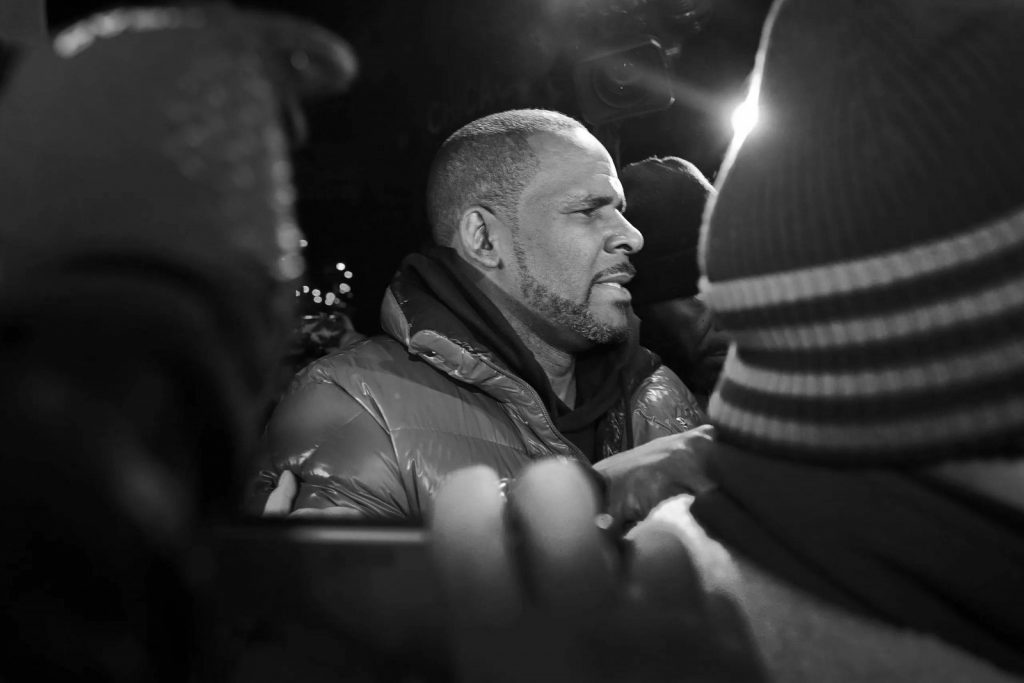CHICAGO, IL - SEPTEMBER 17: Singer R. Kelly turns to leave after appearing at a hearing at the Leighton Criminal Courthouse on September 17, 2019 in Chicago, Illinois. Kelly is facing multiple sexual assault charges and is being held without bail. (Antonio Perez - Pool)
I happened to find myself in the company of people — black men — when the R Kelly trial was underway in 2019. They were trading street-corner observations about how his and Bill Cosby’s very public cases had been handled. The consensus was “the system” was out to get both men and that they would continue consuming their art, irrespective of what new and not-so-new details were emerging.
A film, Surviving R Kelly, aired around that same period, featuring damning testimony from victims of R Kelly’s violence, along with the Gayle King interview on CBS which exposed the childish outbursts of the man known as “The Pied Piper of R&B” to a worldwide audience.
According to those street-corner disciples I was hanging around, like so many of the superstar’s apologists, the evidence of his actions were footnotes to be glossed over because, ultimately, “the system” is a setup that has always been out to keep the black man down.
Soulless: The Case Against R Kelly, is the journalist and author Jim DeRogatis’s tome, which draws on more than two decades of investigative reporting on the game-changing R&B star, mainly while working as a pop music critic for the Chicago Sun-Times.
DeRogatis goes to great lengths to provide the context that informs R Kelly life — the debilitating poverty of the mainly black residents of south and west Chicago’s ghettos, as well as the abusive family background that turned him into the paradox he is: a world-class superstar who wrote and produced music that has traversed generations, but also a narcissistic loose cannon whose god complex led him to believe he was untouchable and indispensable.
DeRogatis’s reporting is exhaustive and his attention to detail never falters. He draws on a relationship with the artist that started when R Kelly was busking on Chicago’s subway platforms; hours of interviews with victims and their families; details from court proceedings and more.
 R Kelly at court in Chicago in 2019 for a sex abuse allegations hearing. (Nuccio DiNuzzo/Getty Images)
R Kelly at court in Chicago in 2019 for a sex abuse allegations hearing. (Nuccio DiNuzzo/Getty Images)
His interest in following up on the man whose career had been dogged by allegations from industry insiders was sparked by a fax from an anonymous source while at the Sun-Times in 2000. Part of it read: “Robert’s problem — and it’s a thing that goes back many years — is young girls.”
The writer admits he initially dismissed the source as “another reactionary”. He wasn’t prepared for what lay ahead after he, along with colleague and legal affairs reporter Abdon Pallasch, broke the story about the sex tape, which led to events that would define his career as a reporter.
That story reads, in part: “The girl in the video, now 17, was identified by her aunt, who said that her niece would have been 14 at the time the tape was made, based on her appearance. Kelly can also be heard on the tape referring to the girl by her first name.”
The investigations leading up to it being published went back three years but it wasn’t until the sex tape’s emergence that the hard evidence required to build a strong case was obtained.
The victim’s testimony was the first of what became a pattern among his other victims. She was coerced into performing uncomfortable sexual acts; she was ordered to have sex at the musician’s whim and the musician “tried to control every aspect” of her life, including her movements.
DeRogatis, who is also a lecturer, doesn’t mince his words: R Kelly’s career continued to thrive amid these allegations because extremely influential people were on his side.
From record label Sony to the publicists, the radio programmers, the festival bookers and the professional associates, some of whom are established artists in their own right, there was a ring of silence that served the artist at the expense of his victims. In addition, the legal framework is to blame.
While grappling with my conflicting feelings when reading the book, especially the first section where the causes of R Kelly’s unhinged conduct are laid out (check out the Soulless review on www.kirkusreviews.com), two seemingly unrelated incidents occurred.
The first was the case of a Rwandan woman who was charged in court with indecent public conduct and immediately sentenced to prison, and the second one of an American therapist who contravened her profession’s guiding principles, and who ended up losing her job, due to people reporting her conduct.
At a glance, they have no relation to R Kelly’s case. Dig deeper and they’re the perfect demonstration of what is going on; the perfect illustration of why the star was left to his own devices, which enabled him to carry on, irrespective of the entire music industry and their mothers and aunts knowing the details of his abusive, predatory behaviour.
That conversation is about empathy and about forgiveness — who deserves it and who doesn’t.
Because of the way women are classed in society (that is to say, they fall out of the bounds of the law) — which inherently makes them undesirable, it’s easy to dismiss their humanity and their capacity to err and to have faults — and to ultimately be forgiven for those faults. We should just focus on the fact that they broke the law.
With men like R Kelly, there is no limit. The women interviewed in the book had been speaking out for a long time, but were not believed. They instead got called groupies and liars who were using their faux proximity to a beloved musical legend to, I don’t know, get their shine?
And this is the purpose of the book, at least for me. While R Kelly is at its centre, it exists to alert us to the many systemic iniquities that lead to the continued suffering of the most vulnerable in our society: black women, the queer community, the disabled, and so forth. For these people, un-forgiveness is an acquired — dare I say deserved? — status and punishment — be it through imprisonment or through taking away their livelihoods.

This happens irrespective of where they are in the world, and of how much they advance in their fields — think of Brittney Griner, the US women’s basketball star who faces nine years in a Russian prison; track star Sha’Carri Richardson’s suspension from the Tokyo Olympics or former Rhodes University student and activist Yolanda Dyantyi’s long battle to clear her name after being banned for life following her activism.
I can’t recall the first time I encountered the music of R Kelly, but I do recall the Bump N’ Grind compilations and the You Remind Me video. I remember a young Aaliyah, Jane Doe #1 in court papers, and how cool she looked with them shades on. And I can remember growing up in the 1990s, when phrases like “age ain’t nothing but a number” were bandied about in the hood whenever age difference was brought up.
This is the rape culture that emboldened R Kelly and that culture has yet to be confronted head-on.
Soulless: The Case Against R Kelly by Jim DeRogatis is published by Abrams Press, R581
I happened to find myself in the company of people, black men, when the R. Kelly trial was underway in 2019. They were trading street-corner observations about how his and Bill Cosby’s very public cases had been handled. The consensus among them was that ‘the system’ was out to get both men, and that they would continue consuming both men’s art irrespective of what new and not-so-new details were emerging.
There was a film, Surviving R. Kelly, that was airing around that same period, featuring damning testimonies from victims of R. Kelly’s violence; along with the Gayle King interview on CBS that exposed the childish outbursts of the man known as The Pied Piper of RnB to a worldwide audience. According to those street-corner disciples I was hanging around, as to every other one of the superstar’s apologists, all of these foolproof instances were footnotes to be glossed over – because ultimately, ‘the system’ is a set-up that has always been out to keep the black man down.
Soulless: The Case Against R. Kelly, is the journalist and author Jim DeRogatis’ tome that draws from more than two decades of investigative reporting he did on the game-changing RnB superstar, mainly while working as a pop music critic for the Chicago-based Chicago Sun-Times.
DeRogatis goes to great lengths to provide the context that informs R. Kelly life — the debilitating poverty by the mainly black residents of South and West Chicago’s ghettos — as well as the abusive family background that turned R. Kelly into the paradox he is: a world-class superstar who wrote and produced music that has traversed generations, but also a narcissistic loose cannon whose god complex led him to believe without doubt that he’s both untouchable and indispensable.
DeRogatis’ level of reporting is exhaustive, truly the stuff of legend; and his attention to detail neither flails nor falters. He draws from a relationship with the artist that started when R. Kelly was busking on Chicago’s subway platforms; hours’-worth of interviews with some of the victims and their families; details from court proceedings; and more.
His interest in following up on the man whose career had been dogged by allegations from industry insiders, was sparked by a fax from an anonymous source while at the Sun-Times in 2000. Part of it read: “Robert’s problem — and it’s a thing that goes back many years — is young girls.”
The author admits to dismissing the source as “another reactionary.” He wasn’t prepared for the full extent of what lay ahead after he, along with colleague and legal affairs reporter Abdon Pallasch, broke the story about the sex tape which later led to events that would define his career as a reporter.
That story reads, in part: “The girl in the video, now 17, was identified by her aunt, who said that her niece would have been 14 at the time the tape was made, based on her appearance. Kelly can also be heard on the tape referring to the girl by her first name.”
 Kelly outside a police station in Chicago. (Scott Olson/Getty Images)
Kelly outside a police station in Chicago. (Scott Olson/Getty Images)
The investigations leading up to its publishing went back three years, but it wasn’t until the sex tape’s emergence that the hard evidence required to build a strong case was obtained. The victim’s testimony was also the first of what became a pattern among his other victims. She was coerced into performing uncomfortable sexual acts; she was ordered to come and have sex at the musician’s whim; and the musician “tried to control every aspect” of her life, including her movements.
DeRogatis, who is also a lecturer, doesn’t mince his words: R. Kelly’s career continued to thrive amidst these allegations because extremely influential people were on his side. From the record label, Sony, to the publicists, the radio programmers, the festival bookers, and the professional associates, some of which are established artists in their own right — there was a ring of silence that ultimately served the artist at the expense of his victims. Additionally, the legal system’s framework is to blame.
While grappling with the conflicting feelings I got from reading the book, especially the first section where the causes of what would later contribute to R. Kelly’s unhinged conduct are laid out (https://www.kirkusreviews.com/book-reviews/jim-derogatis/soulless-r-kelly/), two seemingly unrelated incidents occurred: the first one, a Rwandan case of the woman who was charged with indecent public conduct in court and immediately sentenced to prison; and the second one, of the American therapist who contravened her profession’s guiding principles, and who ended up losing her job due to people reporting her conduct to her place of employment.
At a glance, they have no relation to R. Kelly’s case. Dig deeper, and they’re the perfect demonstration of what is going on; the perfect illustration of why the star was left to his devices, which then enabled him to carry on irrespective of the entire music industry and their mothers and their aunts knowing the details of his abusive, predatory tendencies.
That conversation is about empathy, and about forgiveness: Who deserves it, and who doesn’t deserve it. Because of the way both women are classed in society (that is to say, they fall out of the bounds of the law) — which inherently makes them undesirable, it’s easy to dismiss their humanity and their capacity to err and to have faults — and to ultimately be forgiven for those faults. We should just focus on the fact that they broke the law.
With men like R. Kelly, there is no limit. The women interviewed in the book have been speaking out for a long time, but were not believed. They instead got called groupies and liars who were using their faux-proximity to a beloved musical legend to, I don’t know, get their shine?
And this is the purpose of the book, at least for me: While R. Kelly is at its centre, it exists to alert us of the many systemic iniquities that lead to the continued suffering of the most vulnerable in our society: black women, the queer community, the disabled; and so forth. For these people, un-forgiveness is an acquired — dare I say deserved? — status, and punishment — be it through imprisonment, or through taking away their livelihoods. And irrespective of where they are in the world, and of how much they advance in their fields — think: Brittney Griner, the U.S. women’s basketball star who now faces nine years in a Russian prison; or track star Sha’Carri Richardson’s suspension from the Tokyo Olympics; or former Rhodes University student and activist Yolanda Dyantyi’s long battle to clear her name after being banned for life following her activist actions.
I can’t recall the first time I encountered the music of R. Kelly, but I do recall the Bump n Grind compilations, and the “You Remind Me” video. I remember a young Aaliyah, Jane Doe #1 in court papers, and how cool she looked with them shades on. And I can remember growing up in the ‘90s, when phrases like “age ain’t nothing but a number” being branded about in the hood whenever age difference was brought up.
This is the rape culture that emboldened R. Kelly, and that culture has yet to be fully confronted head-on.
Soulless: The Case Against R. Kelly by Jim DeRogatis is published by Abrams Press, R581